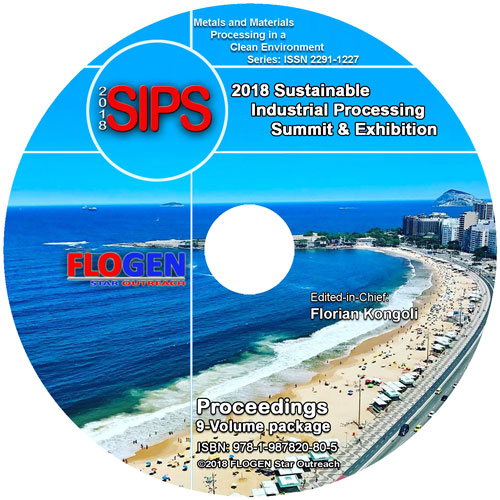2018-Sustainable Industrial Processing Summit
SIPS2018
Volume 6. New and Advanced Materials and Technologies
| Editors: | F. Kongoli, F. Marquis, P. Chen, T. Prikhna, N. Chikhradze |
| Publisher: | Flogen Star OUTREACH |
| Publication date: | 23 December 2018 |
| Pages: | 392 pages |
| ISBN: | 978-1-987820-92-8 |
| ISSN: | 2291-1227 (Metals and Materials Processing in a Clean Environment Series) |

CD shopping page
Engineering of Magnetic Softness and GMI Effect in Thin Magnetic Wires
Arcady Zhukov1; Paula Corte-Leon1; Mihail Ipatov1; Juan Maria Blanco1; Valentina Zhukoa1;1DEPT. PHYS. MATER., UPV/EHU, San Sebastian, Spain;
Type of Paper: Keynote
Id Paper: 328
Topic: 43
Abstract:
Recently, studies of amorphous magnetic wires have attracted great attention, owing to excellent magnetic properties such as magnetic bistability, excellent magnetic, mechanical, and corrosion properties, Giant Magnetoimpedance (GMI) effect [1]. Aforementioned GMI effect consisting of a large change of the impedance of a magnetic conductor under magnetic field is quite interesting for magnetic sensors applications [1].
Recent tendency in devices miniaturization stimulated development of thin (few micrometer diameters) and soft magnetic microwires prepared using Taylor-Ulitovsky method. Excellent soft magnetic properties and GMI effect have been reported for properly prepared and processed Co-rich microwires [1]. Less expensive Fe-rich microwires are preferable for the applications. But amorphous Fe-rich materials exhibit rather high magnetostriction coefficient and consequently present quite low GMI effect [1]. <br /> The most common method for magnetic softness optimization is the annealing. Nevertheless, recently the optimization of soft magnetic properties and GMI effect after are reported mostly for brittle devitrified Fe-rich microwires [1]. <br />From previous studies of Co-rich amorphous materials it is known that stress annealing can considerably affect the magnetic properties of amorphous materials [1]. <br />Consequently, the purpose of this paper is to present our recent experimental results on influence of stress- annealing on magnetic properties and GMI effect of Fe- and Fe-Co based glass-coated microwires. <br />We observed that Fe-rich microwires annealed under stress at appropriate annealing conditions (time and temperature) can present low coercivity, considerable magnetic softening and enhanced GMI effect. For interpretating observed changes of hysteresis loops after stress annealing, we considered internal stresses relaxation and different mechanisms of stress-induced anisotropy. Observed versatile properties of stress annealed glass-coated microwires with enhanced and tunable soft magnetic properties make them suitable for technological sensing applications.